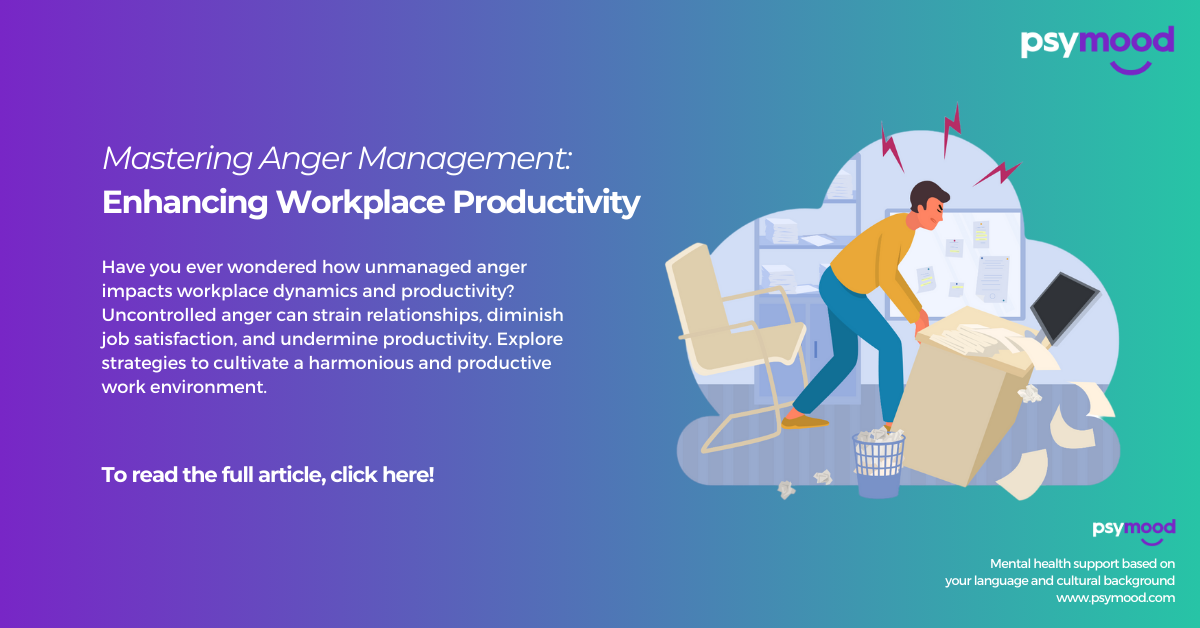Mastering Anger Management: Enhancing Workplace Productivity
Have you ever wondered how unmanaged anger impacts workplace dynamics and productivity? In this article on mastering anger management: enhancing workplace productivity, discover how the impact of unmanaged anger on workplace dynamics may cause a strain on relationships and job satisfaction. Uncontrolled anger can strain relationships, diminish job satisfaction, and undermine productivity. Nonetheless, individuals have the opportunity to acquire effective anger management techniques and strategies to cultivate a harmonious and productive work environment.
To achieve this, individuals must recognize the early warning signs and triggers of their anger. Self-awareness and reflection are pivotal in this process. Moreover, mindfulness practices and deep breathing exercises can aid in staying composed during tense situations.
Effective communication skills are vital in navigating workplace conflicts arising from anger. Learning active listening and assertiveness can facilitate open and respectful dialogue. Additionally, mastering time management, delegation, and collaborative problem-solving techniques can prevent anger stemming from excessive workloads and conflicts.
In conclusion, individuals can foster a positive and productive workplace by acknowledging the significance of anger management and applying these strategies effectively. Take action today to enhance workplace relationships and overall job satisfaction.
1. Recognizing Triggers and Early Warning Signs
The first step in managing anger effectively is recognizing the triggers and early warning signs. Often, anger is a response to specific stressors or situations. By identifying these triggers and acknowledging the physical and emotional cues that precede anger, individuals can intervene before anger escalates.
- Practice self-reflection to identify personal anger triggers.
- Keep a journal to record instances of anger and their underlying causes.
- Pay attention to physical cues like increased heart rate or muscle tension.
- Seek feedback from colleagues or a trusted supervisor to gain perspective.
- Consider attending anger management workshops or therapy for deeper insights.
2. Deep Breathing and Mindfulness Practices
Deep breathing exercises and mindfulness techniques are invaluable tools for anger management. These practices can help individuals stay calm in stressful situations and prevent anger from spiralling out of control.
- Practice deep breathing exercises, like the 4-7-8 technique, regularly.
- Incorporate brief mindfulness sessions into breaks or stressful moments.
- Use mindfulness apps or guided meditation to build mindfulness skills.
- Focus on the present moment, acknowledging emotions without judgment.
- Establish a daily mindfulness routine to prevent anger buildup.
3. Effective Communication Skills
Anger often arises from miscommunication or misunderstandings. Developing effective communication skills is essential for managing anger in the workplace.
- Learn and apply active listening techniques, such as paraphrasing and summarizing.
- Use “I” statements to express feelings and concerns without blaming others.
- Practice assertiveness by calmly and confidently expressing needs and boundaries.
- Develop conflict resolution skills to address misunderstandings promptly.
- Foster a culture of open and honest communication within the workplace.
4. Balancing Workload and Navigating Workplace Conflicts
Excessive workload, tight deadlines, and unresolved conflicts can contribute to workplace anger. Effective time management, prioritization, and adopting constructive conflict resolution techniques are crucial for preventing anger from building up over time. Encourage the use of the “win-win” approach to conflict resolution, fostering cooperation and reducing anger-inducing confrontations.
- Prioritization and Time Blocking: Focus on essential tasks to reduce stress.
- Effective Delegation: Share responsibilities to balance workloads.
- Regular Breaks and Self-Care: Take breaks and practice self-care to manage stress.
- Conflict Resolution Training: Learn constructive conflict resolution techniques.
- Collaborative Problem-Solving: Encourage teamwork to address challenges together.
Managing anger effectively is not just a personal skill; it’s a critical component of maintaining a productive and harmonious workplace. By recognizing triggers, practicing self-awareness, and implementing techniques like deep breathing, effective communication, time management, and constructive conflict resolution, individuals can transform anger from a hindrance into an opportunity for personal and professional growth. Ultimately, a workplace that values and promotes anger management techniques is one where employees can thrive, collaborate, and contribute positively to the organization’s success.
Share your thoughts in the comments below about the mental health challenges businesses encounter concerning mindfulness and productivity. At PsyMood, we specialize in providing customized solutions for businesses and institutions, offering comprehensive support for entrepreneurs, employees, and business owners’ mental well-being. For more details, reach out to us at partnerships@psymood.com.
Our comprehensive services extend to remote employees, offering personalized online or in-person therapy sessions that consider individual needs, cultural backgrounds, geographical locations, and personal interests. Benefit from online or in-person therapy sessions tailored to your needs.
PsyMood is a digital tool designed to help you find the support you need in the language that you are most comfortable with. PsyMood considers cultural background, geographical location, interests, and personal needs, amongst other factors, to pair you with service providers for either online or in-person therapy sessions.
For More Interesting Posts
You may also be interested in learning more about Remote Work and Mental Health: Navigating Challenges and Promoting Balance, Supporting Mental Health and Resilience in First-Generation Canadian Students from Immigrant Families, and Crushing the Curse of Workplace Burnout: Empowering Employees for Resilience and Success.


.png)
.png)
.png)
Recent Comments